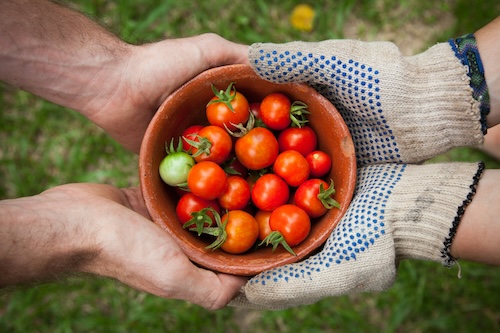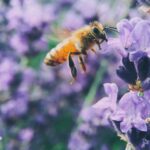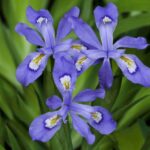As you know, harvesting your vegetables and herbs is very rewarding after months of hard work – from preparing your soil, planting your seeds or seedlings, fertilizing, watering, pruning, weeding, watching them grow, reaping that first perfect tomato or other vegetables and herbs, and finally enjoying them in your summer meals or sharing them with friends and family or donating them to your community.
It’s also rewarding when you’ve mitigated those garden “thieves” like squirrels, wood chucks, deer, and others from enjoying your garden produce before you do. One new CGG gardener was thrilled to tell us that her CGG tomato seedling initially produced two “perfect” large tomatoes. She had planned to pick them one morning…only to find both stolen the night before. She plans to harvest more tomatoes on that plant, but better protect it and pick them earlier.
In New England, many vegetables and herbs can be harvested in August/September, and you can reference this article from the University of Massachusetts Amherst, Center of Agriculture, Food and the Environment to obtain more information on harvesting specific vegetables and herbs. We hope that the tips below on garden maintenance and harvesting will also be helpful.
Late Summer Harvesting & Maintenance:
- Harvest lettuce and spinach and replant for another harvest until late September. Be sure to harvest leaf lettuce in the morning to ensure it is crisp and nutritious.
- Sow beets, kale, Swiss Chard, beans, peas, winter squash, cucumbers, zucchini, arugula and other vegetables and herbs that will mature in 60 days or less. Sow carrots in the shade of other plants.
- Apply a high-potash fertilizer, like tomato food, once fruits form on cucumber, pepper and eggplant plants.
- Remove diseased or spent foliage around vegetables plants.
- Watch for potato and tomato blight; remove affected plants immediately.
- Continue to feed tomato plants with tomato food and remove lower leaves to ensure air circulation, growth and disease prevention. Pinch out the top of tomato plants to increase the growth into the fruit that has formed.
- Cut back your herbs to encourage new leaf growth. Dry or freeze excess herbs.
- Limit the fruits on a squash plant to about three well-established fruits.
- Start harvesting your potatoes, as the leaves turn yellow/die.
- Lift and dry your onions, shallots and garlic once the foliage has flopped and yellowed
- Continue to harvest your zucchini before they become too big. Use large zucchini to bake zucchini breads.
Ongoing Maintenance:
- Water your plants early in the morning and at the roots.
- Weed your garden regularly to direct nutrients to your vegetables and herbs.
- Watch out for pests and if you encounter them refer to our “Animal and Pest Control Tips found on our FGC Resources and Information page.
- Check out our FGC website www.framinghamgardenclub.org for other tips for your gardens.
- Protect yourself from ticks (like deer and dog ticks) with insect repellents, proper clothing, and regular checking after your gardening maintenance. Here is useful information regarding tick testing resources that may be helpful if you encounter ticks while gardening.







